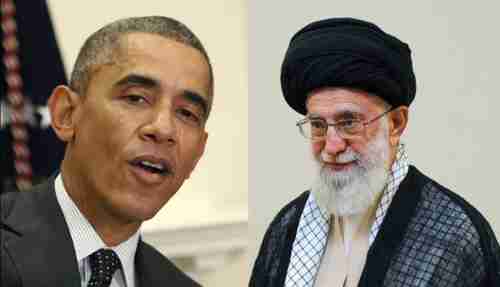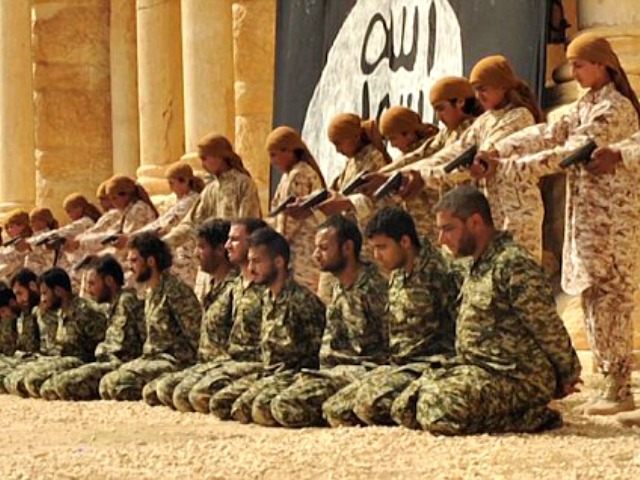This morning’s key headlines from GenerationalDynamics.com
- Behind the scenes in the Iran nuclear deal
- The Arab world is disintegrating into war
- Saudi Arabia conducts major anti-terrorism sweep against ISIS
- Massive bomb attack in Iraq market kills over 130
Behind the scenes in the Iran nuclear deal

President Barack Obama and Ayatollah Seyed Ali Khamenei (AFP)
I like to reference Debka’s newsletter because it contains valuable insights into what’s going on, but it is written from Israel’s point of view, and sometimes gets things wrong. This week’s subscriber-only newsletter (sent to me by a subscriber) contains an analysis of the behind the scenes activities that led to the Iran nuclear deal:
- Iran’s Supreme Leader Ayatollah Seyed Ali Khamenei has been talking about developing nuclear technology, but it really is a bluff, designed to get the US to negotiate the nuclear deal and remove sanctions. Iran has no intention of developing a nuclear weapon while Obama is in office, since the relationship with Obama is more important. — This is plausible, and probably true
- The Shah of Iran was overthrown by Ayatollah Ruhallah Khomeini in 1979 with the support of President Jimmy Carter and his national security advisor Zbigniew Brzezinski. The Shah was double-crossed. — This is plausible, but I have no idea whether it’s true.
- Brzezinski and his long-time associate Brent Scrowcroft were influential in the new Iran-US deal. — This is plausible.
- Obama now expects Iran, perhaps naively, to shoulder most of the burden of fighting the Islamic State (IS or ISIS or ISIL or Daesh) in Iraq and Syria. — It’s plausible that Obama believes this.
- Many Sunni Arab leaders, including Saudi’s new king Salman bin Abdulaziz al Saud, believe that Obama helped bring about the “Arab Spring” in order to help Iran’s rise. — It’s plausible that Arab leaders believe this, but it’s not possible for Obama or any politician to have caused or prevented the Arab Spring. For that matter, Carter and Brzezinski could not have caused or prevented Iran’s Great Islamic Revolution. These great events were caused by enormous generational changes that could not have been stopped any more than a tsunami can be stopped.
- Obama turned his back on the Sunni Arab nations because he sees the Arab world as disintegrating into bloody, hopeless wars.
- The continuing rhetorical fury of Israel’s prime minister Benjamin Netanyahu over the Iran agreement has outlived its usefulness, according to some Israeli officials, who feel he should moderate his statements and instead focus on a new strategy to deal with the new world following the agreement.
Generally, the Debka view is consistent with my article “15-Jul-15 World View — Arab views of Iran nuclear deal,” including the fact that Iran is becoming America’s ally, and the Sunni Arabs will be America’s enemy. Debka
The Arab world is disintegrating into war
The same Debka newsletter points out that the number of conflicts in the Arab world is larger than the number of Arab nations involved in the conflicts:
- Libya has fallen apart and is mired in tribal warfare and war with ISIS.
- Egypt is plagued by frequent terrorist attacks by both ISIS (as “Sinai Province”) and the Muslim Brotherhood.
- Syria is mired in an endless war pitting Bashar al-Assad’s army plus Hezbollah plus Iran plus Shia militias from Iraq, Afghanistan and Pakistan versus ISIS plus other jihadists and the Free Syrian Army (FSA).
- Iraq is in full-scale war with ISIS.
- Lebanon is poised on a knife’s edge from the spillover of the Syrian war.
- Jordan is ostensibly stable, but Bedouin tribes’ traditional loyalty to the crown is being undermined, and Iran, Syria, Hezbollah and ISIS are each poised to move in on Amman.
- Yemen is in a civil war, in which Saudi Arabia, Egypt and Gulf Cooperation Council (GCC) nations are fighting the Iran-backed Houthis. The battle is being exploited by al-Qaeda of the Arabian Peninsula (AQAP) and ISIS to seize large swathes of land.
- Saudi Arabia is caught up in three wars — Yemen, Iraq and Syria — with grave domestic challenges from the Shias in the east and from the 16-19 year old Sunni youths, nearly a third of whom are without jobs and have set up clandestine cells across the kingdom dedicated to toppling the House of Saud.
On the other hand, the United Arab Emirates (UAE) and Oman have lined up behind the Iran nuclear deal and have maintained good relations with Iran. In particular, the UAE expects to gain from the Iran’s post-sanctions import and export trade by having Dubai become the biggest free port in the Gulf.
Debka says that the Arab governments are, like Israel, in a state of disarray after being swept aside by the Iran deal, and in a state of gloom over all the wars going on. The Arab nations need to focus on creating a new Arab regional structure to replace the outdated Arab League.
As we have been saying for many years, the Mideast is headed for a major regional ethnic and sectarian war with 100% certainty, and events seem to bring that war closer every week. This is particularly true of last week’s major event, the Iran nuclear deal.
It is impossible to predict the sequence of political events that will lead to this regional war, but the concept of “a new Arab regional structure” suggests one possibility. My expectation is that, sooner or later, the Arab states will unite with ISIS to fight Iran, Syria and Hezbollah, and this new Arab regional structure may be the political mechanism that brings all these Sunni and Arab elements together to fight Iran. Debka
Saudi Arabia conducts major anti-terrorism sweep against ISIS
In a major anti-terrorism sweep across the country, Saudi Arabia has arrested 431 people believed to belong to ISIS cells, “as part of a scheme managed from troubled areas abroad and aimed at inciting sectarian strife and chaos.” According to the Saudi statement statement:
The number of arrested to date was 431 … detainees, most of them citizens, as well as participants holding other nationalities including Yemeni, Egyptian, Syrian, Jordanian, Algerian, Nigerian, Chadian, and unidentified others.
What combines these cells (which were subjected to security restrictions by not making direct contacts among themselves) is the belonging to the terrorist ISIS organization in terms of the adoption of thought, takfir of society and bloodshed, and then exchanging roles to implement the plans and objectives dictated from abroad.
There have been several terrorist attacks on Shia mosques in eastern Saudi Arabia, and the purpose of the announcement in part was to make it clear to the Shias in the east that the government is doing something. The Saudis claim that they have thwarted six additional planned attacks on Shia mosques.
The fact that over 400 people have been arrested gives an idea of the scale of threat that the Saudis face in ISIS. Saudi Press Agency and AP and Arab News
Massive bomb attack in Iraq market kills over 130
ISIS has claimed responsibility for a massive bomb attack in a crowded open-air market in Khan Bani Saad, a mostly Shia town 20 miles northeast of Baghdad. The death toll is 130 and climbing, making it the biggest ISIS civilian terror attack in the country.
A man in a truck pulled up to the marketplace in the extreme summer heat and said he was selling ice at a discount to celebrate the end of Ramadan. He lured over 100 people to the truck, and the detonated at least one ton of explosives.
Khan Bani Saad is in Diyala province, which borders Iran. It’s the only province in Iraq where Iranian jets are known to have conducted airstrikes against ISIS earlier this year. CNN and AP
KEYS: Generational Dynamics, Iran, Ayatollah Seyed Ali Khamenei, Islamic State / of Iraq and Syria/Sham/the Levant, IS, ISIS, ISIL, Daesh, Ayatollah Rouhollah Khomeini, Shah of Iran, Jimmy Carter, Zbigniew Brzezinski, Brent Scrowcroft, Salman bin Abdulaziz al Saud, Israel, Benjamin Netanyahu, Libya, Egypt, Syria, Hezbollah, Afghanistan, Iraq, Lebanon, Jordan, Yemen, United Arab Emirates, UAE, Oman, Khan Bani Saad, Diyala
Permanent web link to this article
Receive daily World View columns by e-mail

COMMENTS
Please let us know if you're having issues with commenting.